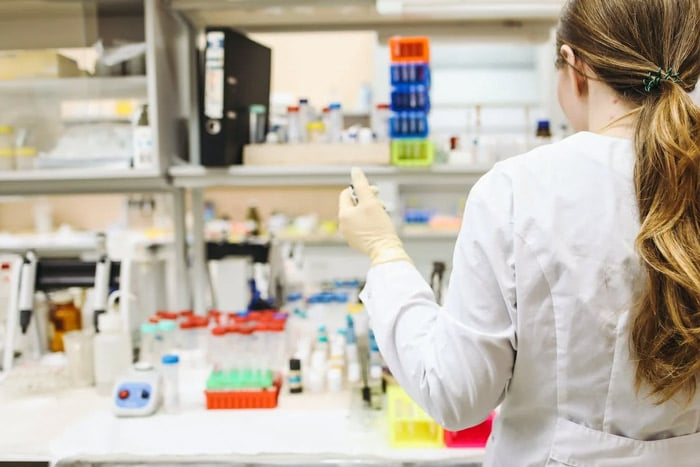
This post presents detailed information on the clinical pharmacist job description, to boost your knowledge of what they do.
It highlights the key duties, tasks, and responsibilities that typically make up the clinical pharmacist work description.
This article also provides the major requirements you may be expected to meet to be hired for the clinical pharmacist role.
Please, continue reading:
What Does a Clinical Pharmacist Do?
The clinical pharmacist job description entails providing professional pharmaceutical care to patients in a variety of healthcare settings.
It also involves ensuring that medications prescribed by physicians are safe and effective for their intended use.
A clinical pharmacist applies his/her knowledge about drugs and diseases to provide patient education regarding medication therapy and disease management.
They ensure that all medications prescribed or administered are appropriate for the patient’s condition and current medical status.
One of their primary responsibilities is to assess the effectiveness of drug therapy and recommend changes to improve it.
The clinical pharmacist job role also entails monitoring adverse effects from medications and reporting these findings to prescribers.
It also involves educating patients about their medications and answering any questions they may have.
Clinical pharmacists review prescriptions before dispensing them.
They help physicians select the most appropriate medications for individual patients, including those who take multiple medications.
Advising physicians on therapeutic alternatives when there are no good alternative choices available is an important part of the clinical pharmacist duties.
They evaluate the appropriateness of prescribing practices and procedures used by other health professionals.
Clinical pharmacists are responsible for evaluating the efficacy and safety of new drugs and devices.
They make sure that the right dose of the right medicine is given at the right time to achieve maximum benefit and minimum harm.
Furthermore, they work closely with other members of the healthcare team, such as doctors, nurses, technicians, dieticians, social workers, etc.
This is to ensure the best possible outcomes for patients.
Clinical pharmacists are involved in research activities related to pharmacotherapy.
They assist in formulating treatment plans for patients and educating them about their medications.
More on Clinical Pharmacist Job Description
Clinical pharmacists counsel patients and families about how to manage medications safely and effectively.
Keeping up-to-date on scientific advances in the field of pharmacy and pharmacology is a key part of their duty.
They provide consultation services to physicians and other health professionals.
Clinical pharmacists collaborate with other healthcare providers to promote optimal medication use.
They play an important role in improving patient adherence to treatment regimens.
It is also the duty of the pharmacist to monitor and report adverse events associated with prescription and over-the-counter (OTC) products.
They are also in charge of maintaining records of all prescriptions dispensed.
Clinical Pharmacist Job Description Sample/Example/Template
The clinical pharmacist job description entails the following tasks, duties, and responsibilities:
- Prescribe medications to patients based on their needs
- Review the patient’s chart and identify areas where improvement can be made
- Educate patients about their medications and teach them proper usage
- Evaluate the effectiveness of the medications being taken by the patient
- Monitor adverse reactions to medications and report them
- Provide counseling to patients based on their medications
- Assist with the development of protocols for the administration of medications
- Ensure that the correct dosage of the medication is administered
- Maintain accurate medical records
- Work with other healthcare professionals to improve overall quality of care
- Make recommendations to physicians regarding changes in drug therapy
- Conduct research in order to further knowledge in the area of pharmaceutical sciences
- Develop educational materials for patients
- Perform administrative functions such as ordering supplies, processing insurance claims, etc.
- Participate in professional meetings and conferences
- Prepare and administer periodic examinations
- Design and conduct continuing education programs
- Manage inventory of medications
- Supervise students in internship or residency training programs
- Serve as a preceptor for interns or residents
- Teach others in the profession.
Clinical Pharmacist Job Description for Resume
If you are writing a new resume or CV as someone who has worked before as a clinical pharmacist or are presently working in that role, you can make a compelling Professional Experience section for the resume by expressing that experience with the sample clinical pharmacist job description above.
You can highlight the clinical pharmacist duties and responsibilities from the above clinical pharmacist job description example in the Professional Experience section of your resume, to show that you have been successful performing the functions of a clinical pharmacist.
This piece of information in your resume can great help to influence the recruiter/employer to give you the job, especially if the new job requires someone with some clinical pharmacist work experience.
Clinical Pharmacist Requirements: Skills, Knowledge, and Abilities for Career Success
If you are seeking the clinical pharmacist role, here are major requirements you might be asked to fulfill to be hired:
- A pharmacy Bachelor’s degree from an approved institution or university
- One year of hospital work experience
- Experience in dispensing medications
- Knowledge of computerized systems used in pharmacies
- Ability to perform duties with little supervision and independently
- Excellent verbal communication skills
- Must have excellent interpersonal skills
- Ability to maintain confidentiality and drive motor vehicles
- Proficiency in Microsoft Office applications
- Good organizational skills
- Ability to multi task
- Strong analytical skills
- Demonstrated ability to handle stressful situations
- Strong ability to communicate effectively with patients, physicians, nurses, pharmacists, and technicians
- Possess ability to work overtime when necessary
- Ability to perform physical activities, including lifting of 50 pounds or more
- Can sit/stand for an extended period of time
- Possess ability to bend, stoop, kneel, crouch, crawl and climb
- Strong ability to use work related hand tools and equipment
- Ability to work in extreme temperatures (i.e., heat, cold).
Clinical Pharmacist Salary
The base compensation for clinical pharmacist ranges from $127,597 to $144,059, with an average base income of $135,470, according to Salary.com.
Conclusion
Pharmacists are responsible for ensuring safe and effective use of drugs by individuals.
They also provide information about prescription drugs and non-prescription products to consumers.
In addition, they advise doctors on appropriate uses of medications and monitor adverse reactions to drugs.
This post is helpful to individuals interested in the clinical pharmacist career; they can increase their knowledge of what clinical pharmacists do from the content on this page.
It is also useful to recruiters/employers in creating a detailed job description for the vacant clinical pharmacist position in their organization, for use in the hiring process for the role.












